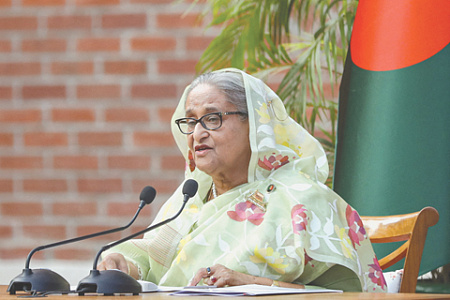
Former Prime Minister Sheikh Hasina, who ruled for more than 10 years, has been charged with human rights violations and other sins in Bangladesh. But she is not in the country, she flew to India after the coup in August 2024. The West approved the coup and the creation of an interim government in Dhaka, the capital, led by Nobel Prize winner Muhammad Yunus. This process is directed against India, which had almost allied relations with its neighbor before the coup. Dhaka felt that India, embroiled in a conflict with Pakistan, would have to put up with the persecution of her friend.
Bangladesh, a country of 175 million people, is not being pampered by the Western press. However, the sufferings of people belonging to the Rohingya nationality and fleeing from repression in Bangladesh are often written about. Meanwhile, the coup hit the supporters of the former prime minister and her Awami League party with one end, and India with the other. This affects the balance of power in South Asia, where Russia, China, the United States and other great powers have their own interests. So the court procedure that has begun cannot leave them indifferent.
The problem is that today and yesterday are tied up in a tight knot in Bangladesh. In 1971, when Bangladesh declared independence, Mujibur Rahman, the hero of the liberation struggle and the founding father of the republic, was in a Pakistani prison. And Indian troops defeated the Pakistani military units and took Dhaka. The Indians were helped by guerrillas who fought in the rear. This is not to say that Islamabad had no support in East Pakistan at that time. The Pakistanis were supported, in particular, by Islamists. After the end of hostilities, they were legalized as a party. They are involved in an attempt to suppress the liberation movement through brutal violence. And now the authorities have allowed this party to come out of hiding and become legal.
The picture will be incomplete if we do not mention the role of Moscow and Washington. The Soviet Union quickly fulfilled its obligations to supply weapons and ammunition to India, and supported its actions at the United Nations. And the United States sided with Pakistan. They even sent an aircraft carrier to the shores of India to put pressure on it.
This is the story. And now a special tribunal in Dhaka has begun the trial of the deposed prime minister. She is charged with crimes against humanity during the student protests last year. Then, according to the AP news agency, several hundred people were killed. The Tribunal also issued an arrest warrant for the former Interior Minister. But he’s gone, and he’s probably in India, too. And the current authorities managed to arrest the former police chief. Dhaka has sent an official request to Delhi demanding that Hasina be deported.
The interim Government also banned the Awami League party, to which Hasina and her father, a hero of the liberation movement, belonged. He was killed by the military during an insurgency in 1975. This tragedy, which killed not only the country’s first president Mujibur Rahman, but also his wife, young son, and all the guards, happened half a century ago. Young people who suffer from unemployment, lack of money, have forgotten about it or prefer not to remember it. The pendulum of public sentiment has swung away from the former prime minister. The Awami League, which back in the days of British rule advocated the creation of a state where all religious communities would be equal, was outlawed, and the Islamist party was allowed to return to the political scene. Even the Western media is not happy about this. Moreover, The New York Times in its article expressed concern that Islamists would come to power who would suppress the rights of women and religious minorities.
Delhi officially takes a restrained position. But he protested to Dhaka against the outrages in the streets, during which Hindu temples were attacked. The Indian Foreign Ministry also expressed concern about the ban on the Awami League party.
Russia, which has maintained friendly relations with Bangladesh since the events of 1971, is building a nuclear power plant in the country under contract. It is critically important for the economy of a country experiencing a shortage of energy supply.
In an interview with NG, Sergey Velichkin, Associate Professor at the Diplomatic Academy of the Ministry of Foreign Affairs of the Russian Federation, noted: “The NPP project is very important for Bangladesh. And I don’t know that there have been any attacks on how Russia executes it. Indeed, in such an overpopulated country, both food security and industry, which is focused on exporting cheap fabrics and clothing, depend on energy. As for the trial of Hasina, the leaders of the parties who want to remove the Awami League from the scene are interested in it.
